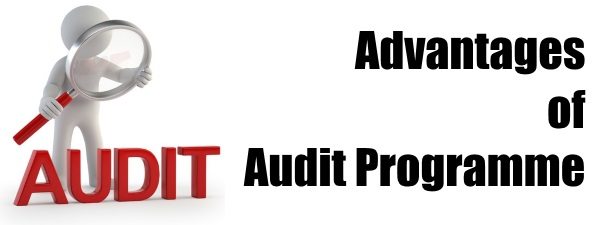Audit Programme | Specimen | Advantages | Disadvantages
Table of Contents
What is an Audit Programme?
The written plans prepared by an auditor showing the nature, duration and extent of the audit procedures to be adopted to conduct the audit more efficiently and effectively is called audit programme.
While developing the audit programme, the auditor considers;
- Organizational structure of the firm, nature of business, its size and complexity.
- The experience he already had in the organization.
- Present environment under which the organization is functioning.
The auditor before designing the audit programme, holds discussion with the management. He analyzes the previous year’s working papers, minutes, annual report and internal audit reports.
The auditor distributes the works to the audit staff through audit programmes, thereby facilitating effective supervision and control of audit.
Revision of audit programme shall be done by Auditor any time after the commencement, if he encounter any change in circumstances such as weaknesses in internal control in some areas, so that it suits the current circumstances.
Specimen copy of an Audit Programme
The following is a specimen copy of an audit programme for the year ended 31 March 2015.
| Particulars | Period of Verification | Name of the Persons | To be completed by | Completed on |
|---|---|---|---|---|
| Cash Book: | A, B | 25th July | 30th July | |
| Vouching: | First 3 and Last 3 Months | |||
| Posting: | ||||
| Casting: | First 2 and Last 2 Months | |||
| Supervisor Signature: | ||||
| Signature of Audit Staff: | ||||
| Purchase Day Book: | C, D | 29th July | 31st July | |
| Vouching: | First 1, 2, last and any 1 month in the middle | |||
| Posting: | ||||
| Casting: | All the above 5 months | |||
| Signature of Audit Staff: | ||||
| Supervisor Signature |
Advantages of Audit Programme

1. All the important areas will be covered in the audit programme and thus there will be no chance of omitting any important area while conducting the audit.
2. The audit work will be allotted to the audit staff according to their efficiency and experience.
3. Audit programme facilitates better control and supervision of audit work.
4. The subsequent audit programme can be drawn on the basis of the existing audit programme.
5. If any error is found in the audit work, the person responsible for such mistake can be easily found out.
6. It serves as the evidence for conducting the audit. The auditor uses it as protection, if he is charged with negligence in performing his duties. He can prove through the audit programme that he has conducted his work with due care and diligence.
7. The efficiency of the audit staff increases and even if an audit staff goes on leave, others can continue the work by referring to the audit programme.
Disadvantages of Audit Programme

The disadvantages that may be experienced by conducting audit as per Predetermined audit programme are;
1. The audit staff may find the work mechanical, and fail to notice unusual features (if any) in the organization.
2. The audit staff may not develop any innovative techniques in audit. Initiatives on the part of the staff may not be encouraged in the per-determined audit programmes.
3. The audit staff will be more interested to complete the work in time rather than to maintain any standard in the work.
4. Staff cannot take their own decisions and they are compelled to comply with the audit programme.
5. The audit programme may not be revised from time to time even after errors noticed during the audit.
6. During the course of audit, new areas to be verified may come to the notice of the audit staff Unless the audit programme is revised, such areas may escape from auditing.
7. Pr-determined audit programme may not be suitable for small organizations.
